- Home
- Paula McLain
The Paris Wife: A Novel Page 10
The Paris Wife: A Novel Read online
Page 10
“In any case, he’s going to send some of my poems to Scofield Thayer at the Dial.”
“Not stories?”
“I don’t have anything good enough yet, but Pound said I should write some articles for them about American magazines.”
“Well, that’s flattering.”
“This has to be the beginning of something,” Ernest said. “Pound says he’ll teach me how to write if I teach him how to box.”
“Oh, God help us,” I said, laughing.
Our next major introduction came a few weeks later, when Gertrude Stein invited us to tea. Strangely, it went much the same way our encounter with Pound and Dorothy had. There were two corners here, too, one for the men—in this case, Ernest and Stein—and one for the women, with no crossover whatsoever.
When we arrived at the door, a proper French maid met us and took our coats, then led us into the room—the room, we knew by now, the most important salon in Paris. The walls were covered with paintings by heroes of cubism and postimpressionism and the otherwise highly modern—Henri Matisse, André Derain, Paul Gauguin, Juan Gris, and Paul Cézanne. One striking example was a portrait of Stein done by Picasso, who had long been in her social circle and often attended her salon. It was done in dark browns and grays, and the face seemed slightly detached from the body, heavier and blockier, with thickly lidded eyes.
She seemed to be somewhere between forty-five and fifty, with an Old World look to her dark dress and shawl and to her hair, which was piled in great skeins onto her beautiful head. She had a voice like rich velvet and brown eyes that took in everything at once. Later, when I had time to study her, I was struck with just how like Ernest’s her eyes were—the deepest and most opaque shade of brown, critical and accepting, curious and amused.
Stein’s companion, Alice Toklas, looked like a tight string of wire in comparison. She was dark in coloring with a sharply hooked nose and eyes that made you want to look away. After a few minutes of general conversation, she took my hand and off we went to the “wives’ corner.” I felt a twinge of regret that I wasn’t a writer or painter, someone special enough to be invited to talk with Gertrude, to sit near her in front of the fire, as Ernest did now, and speak of important things. I loved to be around interesting and creative people, to be part of that swell, but for the time being I was removed to the corner and interrogated by Miss Toklas on current affairs, about which I knew nothing. I felt like an idiot, and all the while we had tea and more tea and tiny, artfully arranged cakes. She did needlepoint, her fingers moving endlessly and efficiently. She never looked down and never stopped talking.
Meanwhile, Ernest was sharing a glass of some sort of gracefully tinted liquor with Gertrude. I think I half fell in love with her that day, from a distance, and Ernest did, too. When we walked home he had much to say about her taste, which was innovative and impeccable. He also admired her breasts.
“What do you think they weigh?” he asked. He seemed to seriously want to know.
I laughed. “I couldn’t even wager a guess.”
“How about them living together? Women, I mean.”
“I don’t know. They have such a life.”
“The paintings alone. It’s like a museum in there.”
“Better,” I said. “There are cakes.”
“And eau-de-vie. Still, it’s strange. Women together. I’m not sure I buy it.”
“What do you mean? You don’t believe they can get anything substantial from one another? That they love each other? Or is it the sex you don’t buy?”
“I don’t know.” He bristled defensively. “She said women together are the most natural thing in the world, that nothing is ugly to them or between them, but men together are full of disgust for the act.”
“She said this?”
“In broad daylight.”
“I suppose it’s flattering she was so open with you.”
“Should I give her an earful about our sex life next time?”
“You wouldn’t.”
“I wouldn’t.” He smiled. “She might want to come watch.”
“You’re horrible!”
“Yes, but you love me for it.”
“Oh, do I?” I said, and he swatted me on the hip.
Two weeks later, Gertrude and Alice accepted our invitation to come to tea in our dreary flat. What they thought as they climbed the dim and ramshackle stairwell, past the pissoir and the ghastly smells, I could hardly bear to guess—and yet they were gracious and accommodating, behaving as if they came to this quarter of Paris all the time. They drank our tea out of the wedding-gift china teapot—that at least was nice—and sat on the mahogany bed.
Gertrude had offered to look at some of Ernest’s work, and now she asked for it, reading quickly through the poems, a few stories, part of a novel set in Michigan. Just as he’d done in Chicago, when I read his work for the first time, Ernest paced and twitched and seemed to be in pain.
“The poems are very good,” Stein said finally. “Simple and quite clear. You’re not posing at anything.”
“And the novel?”
I thought he was very brave to ask or even show her the pages, because he was newly in love with it. So protective was he, he had shown me next to nothing.
“It’s not the kind of writing that interests me,” she said finally. “Three sentences about the color of the sky. The sky is the sky and that’s all. Strong declarative sentences, that’s what you do best. Stick to that.”
As Stein spoke Ernest’s face fell for a moment, but then he recovered himself. She’d hit on something he’d recently begun to realize about directness, about stripping language all the way down.
“When you begin over, leave only what’s truly needed.”
He nodded, lightly flushed, and I could almost hear his mind closing in on her advice and adding it to Pound’s. “Cut everything superfluous,” Pound had said. “Go in fear of abstractions. Don’t tell readers what to think. Let the action speak for itself.”
“What do you think about Pound’s theory about symbolism?” he asked her. “You know, that a hawk should first and foremost be a hawk?”
“That’s obvious, isn’t it?” she said. “A hawk is always a hawk, except”—and here she raised one heavy eyebrow and gave a mysterious smile—“except when the hawk is a cabbage.”
“What?” Ernest said, grinning and game and clearly perplexed.
“Exactly,” Gertrude said.
FOURTEEN
ver the coming weeks, Ernest took Gertrude’s advice and pitched out most of the novel to begin from scratch. During this time, he came home whistling and famished and eager to show me what he’d done. The new pages crackled with energy. It was all adventure, hunting and fishing and rutting. His character’s name was Nick Adams and he was Ernest but bolder and purer—as Ernest would be if he followed every instinct. I loved the material and knew he did, too.
In the meantime, he’d discovered Sylvia Beach’s famous Shakespeare and Company on the Left Bank and was surprised to find she’d lend him books on credit. He came home with his arms loaded down with volumes of Turgenev and Ovid, Homer, Catullus, Dante, Flaubert, and Stendhal. Pound had given him a long reading list that was sending him back to the masters and also pointing him forward, toward T. S. Eliot and James Joyce. Ernest was a good student. He devoured everything, working his way through eight or ten books at once, putting one down and picking another up, leaving tented spines all over the apartment. He’d also borrowed Three Lives and Tender Buttons, two books Gertrude had published to a very small audience. It seemed most of the literary world didn’t know what to make of her strangeness, and neither did Ernest. He read one of the poems from Tender Buttons aloud to me: “A carafe, that is a blind glass. A kind in glass and a cousin, a spectacle and nothing strange a single hurt color and an arrangement in a system to pointing.”
He put the book down, shaking his head. “ ‘A single hurt color’ is nice, but the rest just goes right through me.”
; “It’s interesting,” I said.
“Yes. But what does it mean?”
“I don’t know. Maybe it doesn’t mean anything.”
“Maybe,” he said, and picked up Turgenev again.
It was April by this time, our first spring in Paris, and the rains fell soft and warm. Since we’d first arrived, Ernest had been supplementing our small income by writing editorials for the Toronto Star. One day he received notification from his editor, John Bone, that they wanted him in Genoa for an international economic conference. They would pay him seventy-five dollars a week plus expenses, but there wasn’t any allowance made for wives. I would stay in Paris, the first separation in our seven months of marriage.
“Don’t worry, Cat,” he said as he packed up his beloved Corona. “I’ll be back before you know it.”
For the first few days, I enjoyed my solitude. Ernest was such a big person, metaphorically speaking. He took up all the air in a room and magnetized and drew everyone to him, men and women and children and dogs. For the first time in many months, I could wake to quiet and hear my own thoughts and follow my own impulses. But soon enough there was a shift. I don’t know how to describe it, but after the blush of my own company wore off, I became so aware of Ernest’s absence it was as if the lack of him had moved into the apartment with me. His shadow was there at breakfast and at bedtime. It hung from the curtains in the bedroom where the accordion music pushed in and out like a bellows.
Ernest had suggested I go to Sylvia’s bookshop for tea, and though I did go once, I couldn’t help but think she was just being polite by engaging me in conversation. She liked writers and artists, and I was neither. I went to dinner at Gertrude and Alice’s, and although I felt they were truly becoming friends, I missed Ernest. His was the company I liked best. It was almost embarrassing to admit how dependent on him I’d become. I tried to stave off depression by going everywhere I was invited and staying out of the apartment as much as possible. I haunted the Louvre and the cafés. I practiced for hours at a new Haydn piece to perform for Ernest when he returned. I thought playing would make me feel better, but in truth it only reminded me of the worst times in St. Louis, when I was lonely and cut off from the world.
Ernest was gone for three weeks, and by the end of that time I was sleeping so badly in our bed I’d often move in the middle of the night to an upright wingback chair and try to rest there, huddled in blankets. I couldn’t enjoy much of anything except walking to the Île St.-Louis to the park I’d come to love and rely on. The trees were flowering now, and there was the thick smell of horse chestnut blossoms. I also liked to look around at the houses surrounding the park and wonder about the people who filled them, what kinds of marriages they had and how they loved or hurt each other on any given day, and if they were happy, and whether they thought happiness was a sustainable thing. I’d stay in the park as long as I could, and then walk home through sunshine I couldn’t quite feel.
When Ernest finally came home in May, I squeezed him hard, my eyes filling with tears of relief.
“What’s this now? Did you miss me, Feather Cat?”
“Too much.”
“Good. I like to be missed.”
I nodded into his shoulder, but part of me couldn’t help wondering if it was good to rely on him so utterly. He admired my strength and resilience and counted on it; more than this, I liked feeling strong and was uncomfortable knowing that had vanished when he left. Was my happiness so completely tied to him now that I could only feel like myself when he was near? I had no idea. All I could do was undress him slowly while, in the dance hall below us, the accordion wrenched away at a melancholy tune.
We had over two hundred dollars from the Toronto Star burning with possibility when Ernest came back, and decided to splurge on a trip to Switzerland. He was feeling good about nearly everything just then. Scofield Thayer at the Dial had recently sent back the poems Pound had recommended with a stingingly impersonal rejection letter, but Ernest had made a lot of new connections in Genoa, other correspondents he’d worked closely with such as Max Eastman, an American editor who wanted Ernest to send along some of his prose sketches, and Lincoln Steffens, the famous muckraking journalist who impressed Ernest to no end with his bold politics. Steffens had recently traveled to the Soviet Union and come back with an enthusiasm for communism, telling the press and anyone else who would listen, “I have been over into the future, and it works.” Ernest was thrilled to have Steffens take notice of him and, bolstered by a new sense of community and ambition, he’d just sent off fifteen poems to Harriet Monroe at Poetry.
“Why the hell not?” he said. “Maybe the door won’t open unless I bang on it loud and long.”
“It’s all going to happen for you,” I said. “I feel it coming.”
“Maybe,” he said, “but let’s not jinx it by talking about it.”
We bought third-class tickets to Montreux, and then took the electric tram straight up the mountainside to Chamby, which overlooked Lake Geneva. Our chalet was large and rough, and the mountain air was wonderfully clear. We spent hours a day hiking on densely forested mountain trails and came back to a lunch of perfectly roasted meat, winter squash and parsnips, and stewed fruit with heavy cream. At night, we read by the fire and drank mulled wine with lemon and smoky spices. We slept as much as we wanted, made love twice a day, read and wrote letters and played cards.
“You’re so tan and strong and healthy,” Ernest said to me as we hiked one day. “Everything seems to agree with you here.”
I liked to hear any praise from him, but those weeks alone in Paris were still on my mind. They’d scared me and had me thinking about what it meant to be really strong, on my own terms—not just fit and brown from the sun, not just flexible and accommodating.
After the first week, Ernest’s old war friend Chink Dorman-Smith joined us. The two had met in Schio, at the Italian front, before Ernest was wounded. Chink was Irish, as tall as Ernest but much fairer, with ruddy cheeks and a red-blond mustache. I liked him immediately. He had the most beautiful manners, much more suited to someone who’d spent time at court than the professional soldier he was. Every morning he came to breakfast humming merrily and calling me Mrs. Popplethwaite. Ernest loved Chink like a brother and had endless respect for him. He wasn’t competitive with him as he could be with many of his writer or reporter friends, and so the time was easygoing, day after day. The Rhone Valley was in top form just then, with narcissus blooming in every bare patch of meadow and in the jagged crevices of rock. The first time I saw a narcissus pushing through ice and thriving, I thought it was perfect and wanted that kind of determination for myself.
Every day we tramped well into the mountains to find nice inns and promising fishing spots. The Stockalper, a stream near the junction of Lake Geneva and the Rhone, was Ernest’s favorite place this side of northern Michigan. He spent hours there happily hooking trout while Chink and I lounged in the grass and read or talked.
“It’s wonderful to see the two of you in love this way,” Chink said one afternoon as we lounged in the shade of a blossoming pear tree. “There were times I wondered if Hem would ever get over Milan.”
“Milan or his beautiful nurse?”
“Both, I guess,” he said. “That whole time hardly brought out the best in him. But you do.” Chink crossed his arms behind his head and closed his eyes. “Good old Hem,” he said, and then promptly fell asleep.
I liked that Chink saw and understood what was good in us. He also knew things about Ernest I didn’t. They shared a history, oceans of beer, late-night confessions. Sometimes they talked about the war in the long cool evenings on the chalet’s wide porch, and it gave me a new appreciation for what they’d both seen and endured.
Chink was and would always be a soldier. When Ernest went home to his life in the States, Chink stayed on with the British army. For the past several years he’d been stationed in Ireland with a British occupying force that was trying to control violence in the Irish fig
ht for independence. It was a difficult post, and he’d seen a good bit of death, which you could feel him trying to throw off a little more every day he was with us.
“It must be so strange,” I said to him one evening, “with terrible fighting going on there, and you boarding a ship to take a holiday from it. Just buying a ticket and stepping away.”
Chink laughed darkly. “In our war”—he paused to nod to Ernest—“when the front ran all the way to the English Channel, there were men who got short furlough to go home for tea. They’d come back again and pick up their bayonets and gas masks and get to it, still tasting biscuit crumbs on their tongues.”
“Your mind can’t survive that, though,” Ernest said. “You can’t keep up with that jump. You get stuck one place or the other, or somewhere between. And that’s when the crack-up starts.”
“That’s right,” Chink said.
“Sometimes, though, once you’ve been to war and have that in you, you can go back there. And that’s sort of like what you were saying, Tiny.” He nodded to me over the table, meeting my eyes. “Like buying a ticket and going there, and then climbing out of it again when you snap to or wake up.”
“That’s not always so pleasant, is it?” Chink said, because he knew about Ernest’s nightmares of the front, and the way he still woke in the middle of the night, sweating and screaming with his eyes wild and terrified. The two friends nodded at one another and lifted their glasses.
It was on one of these evenings full of drink and talk that Chink brought up the idea of crossing the Great St. Bernard Pass into Italy.
“It was good enough for Napoléon and Charlemagne,” he said, sweeping beer foam from his mustache.
“How far do you think it is?” I asked.
“Maybe fifty kilometers?”
“Let’s do it,” Ernest said. “From Aosta, we can take the train to Milan.”
“Or Schio,” Chink said. “Return to the scene of the crime.”

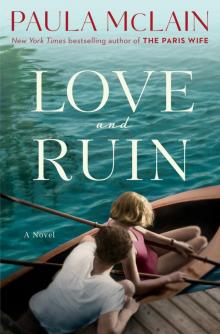 Love and Ruin
Love and Ruin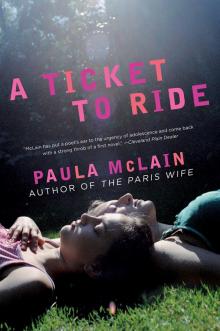 A Ticket to Ride
A Ticket to Ride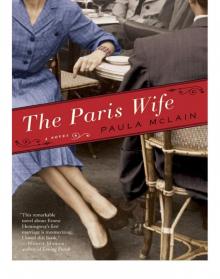 The Paris Wife
The Paris Wife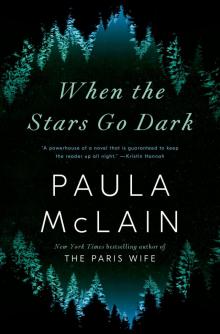 When the Stars Go Dark: A Novel
When the Stars Go Dark: A Novel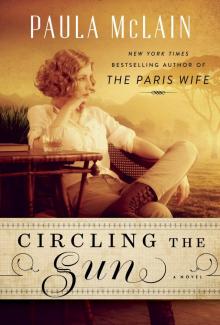 Circling the Sun
Circling the Sun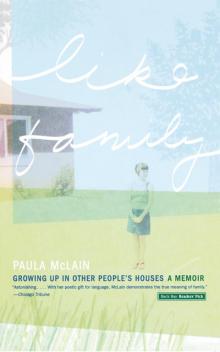 Like Family
Like Family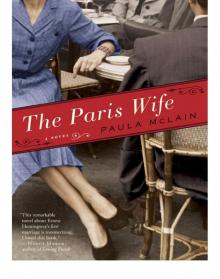 The Paris Wife: A Novel
The Paris Wife: A Novel